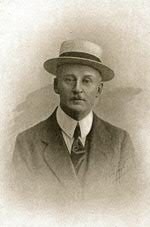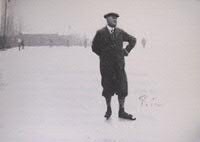Captain van Jong Holland hees zichzelf op het schild
De grondlegger van de moderne sport in Nederland: zo staat Pim Mulier te boek. Hij is onder meer bedenker van de Elfstedentocht en oprichter van de Nederlandse Voetbal Bond. Maar hij was ook een vat vol tegenstrijdigheden, die zichzelf op het schild hees. Dat concludeert Daniël Rewijk, die 12 maart promoveert aan de Rijksuniversiteit Groningen - twee dagen na de 150ste geboortedag van Mulier. ‘Mulier werkte actief mee aan het construeren van zijn imago als grondlegger van de moderne sport,’ betoogt Rewijk. ‘Maar ik geef ook aan waarom het publiek daar zo ontvankelijk voor was.’
Daniël Rewijk schetst in zijn biografie van Willem Johan Herman (Pim) Mulier (1865-1954) een beeld dat verder gaat dan het gebruikelijke. In Muliers leven komen cruciale tegenstellingen van de late negentiende eeuw samen: regionale traditie én internationale vernieuwing; standsbewustzijn én democratisering; internationale netwerken én nationalisme; behoudzucht én vernieuwingsdrift. ‘Pim Mulier wordt vaak belicht als stichter van de moderne sporten,’ aldus Rewijk. ‘Ik schets een breder beeld. Zijn bemoeienis met sport kwam voort uit zijn maatschappelijke, culturele en politieke overtuigingen, die zelf niet altijd consequent waren. Mulier was inderdaad niet altijd de grote grondlegger waarvoor we hem soms houden.’

Belang Pim Mulier
Muliers belang schuilt vooral in zijn visie op sport en zijn invloed op ideeën van anderen over moderne lichaamscultuur, aldus Rewijk. ‘Sport was voor hem onder meer een instrument van nationalisme: het kon bijdragen aan de kracht, vitaliteit en karakter van ‘Jong Holland’. Een fitte bevolking met verantwoordelijkheidsbesef zou in staat zijn Nederland als koloniale macht te handhaven en wellicht te versterken met een kolonie in Zuid-Afrika.’
Nieuwe lichaamscultuur
In het laatste kwart van de negentiende eeuw veranderde de lichaamscultuur in Nederland ingrijpend. Grote sociale veranderingen brachten een nieuw burgerschap voort, waarin aan het lichaam nieuwe eisen werden gesteld. Traditioneel sportief vermaak veranderde en onder welgestelde jongeren werden nieuwe sporten uit het buitenland populair. Mulier, zelf een elitefiguur, introduceerde enkele sporten waaronder de latere volkssport voetbal. Maar hij was ook een exponent van het idee van volksverheffing: sport had pas waarde als massaverschijnsel als het in elitaire omgangsvormen werd gegoten. De gedragscode van de sportieve gentleman stond voorop. ‘Hij zag dit echter steeds meer verloren gaan in de sport,’ vertelt Rewijk. ‘Daarnaast werden zijn inspanningen door het behoudende deel binnen de elite minder serieus genomen. Tijdgenoten met een succesvolle loopbaan in politiek of bedrijfsleven genoten meer aanzien, tot ergernis van Mulier. Zijn maatschappelijk prestige was gekoppeld aan de sportzuil, die hem bij plechtigheden en jubilea op het schild hees als de grote pionier.’

Beeldhouwer van eigen mythe
Na 1910 keerde Mulier zich teleurgesteld af van de snelle veranderingen in de maatschappij. Hij werd een reactionair die tekeerging tegen ‘uitwassen’ van de moderniteit, zoals automobilisme en abstracte kunst. Meer en meer verschanste hij zich in een historiserende levensstijl, beschermd tegen de opmars van ‘het volk’, de massamedia en ruwe manieren. In deze periode wordt zijn imago als stichter van de Nederlandse sport geconstrueerd. Rewijk: ‘Mulier schreef zelf actief mee aan deze oorsprongsmythologie. Maar de latere uitvergroting van zijn rol komt grotendeels voort uit de behoefte van zijn tijdgenoten aan een ‘Grote Man’ die een belangrijke verandering had aangezwengeld - in dit geval de opkomst van moderne sport in Nederland.’ Door de voortdurende herhaling van zijn reputatie is de Muliermythe blijven hangen in de collectieve herinnering. In de laatste jaren zijn Muliers verdiensten echter al herhaaldelijk betwist.
Curriculum vitae
Daniël Rewijk studeerde Geschiedenis. Hij verrichtte zijn onderzoek aan de Faculteit Godgeleerdheid en Godsdienstwetenschap van de Rijksuniversiteit Groningen. Promotores zijn prof. dr. Y.B. Kuiper (RUG) en prof. dr. M. van Bottenburg (UU). Rewijk werkt als geschiedenisdocent in het voortgezet onderwijs en als sporthistoricus bij het Mulier Instituut. Op 10 maart (twee dagen voor de promotie) is de 150ste geboortedag van Mulier. Het proefschrift verschijnt in handelseditie bij uitgeverij Bornmeer, ISBN 978-90-5615-345-8.
Meer informatie
- Daniël Rewijk, danielrewijk@gmail.com
- Rewijks dissertatie
Meer nieuws
-
06 januari 2026
Geschiedenis dichterbij brengen
-
10 juni 2025
RUG en Rijksmuseum tekenen samenwerkingsovereenkomst
